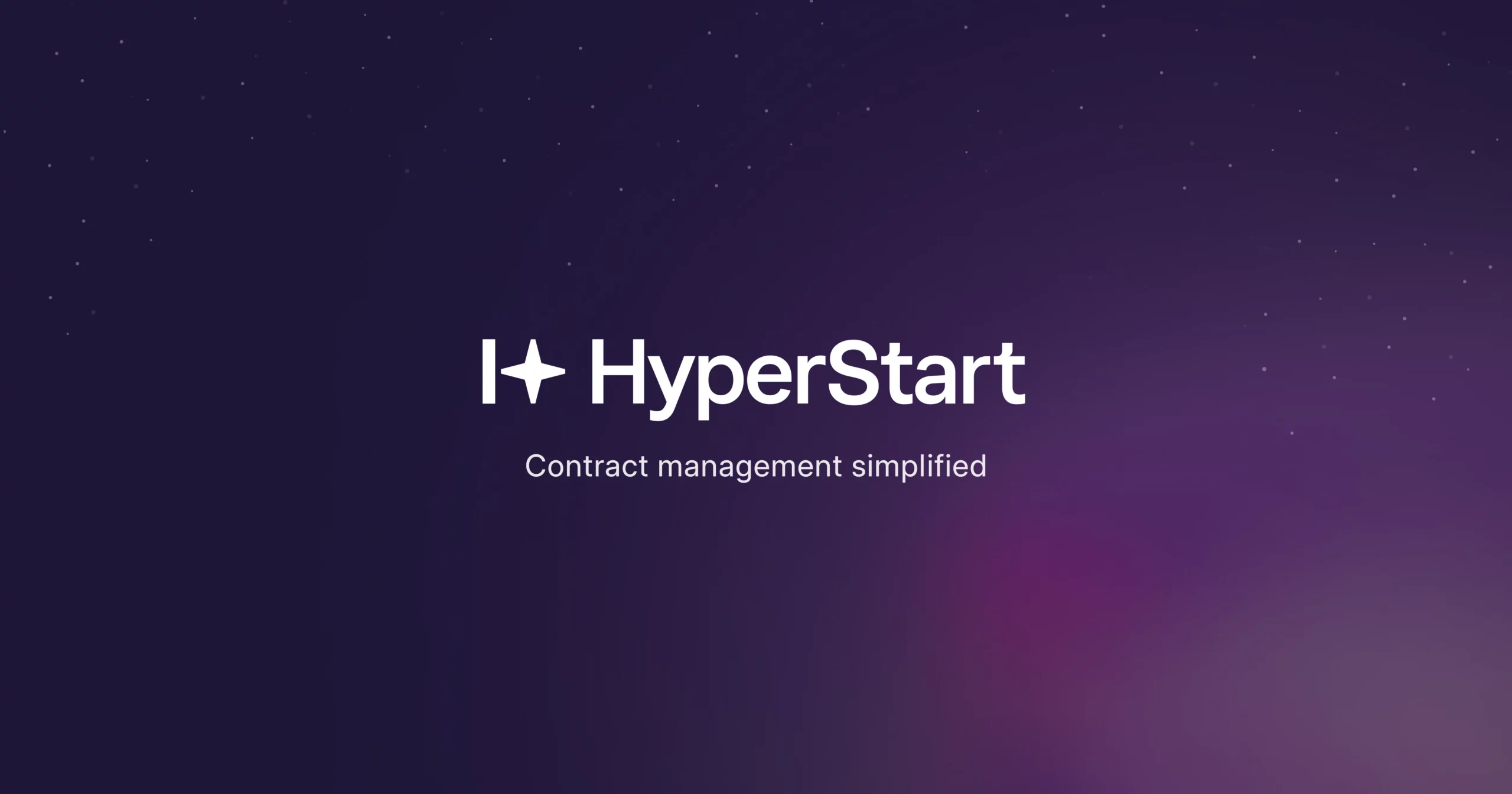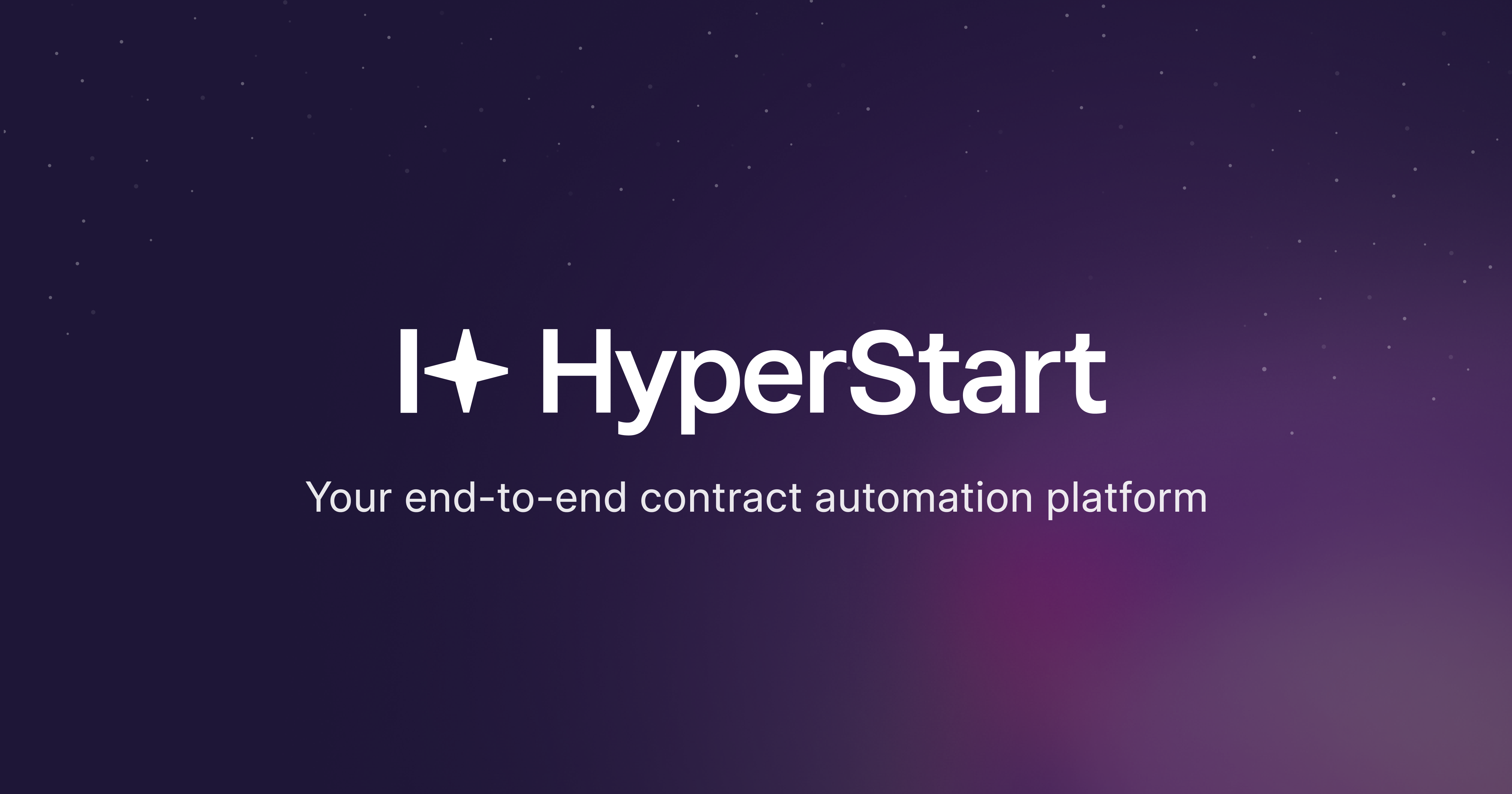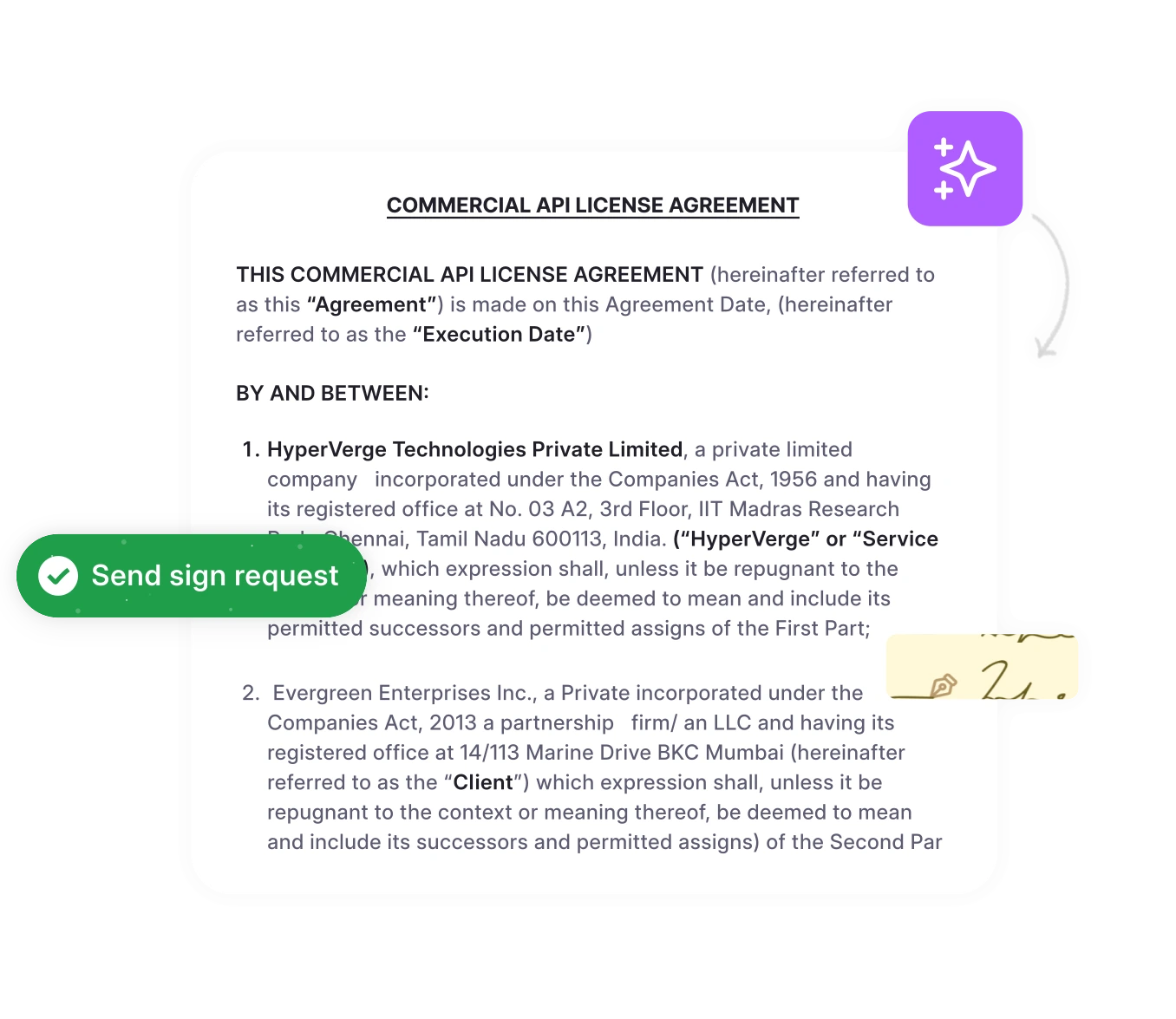When contracts are scattered across emails, shared drives, devices and filing cabinets, even skilled legal professionals struggle to maintain visibility and control. Your legal team shouldn’t spend weekends hunting for contract clauses or meeting renewal deadlines.
A well-structured contract management team transforms this chaos into organized operations, ensuring agreements drive business value rather than create administrative burdens.
The modern contract management team serves as the strategic backbone of your organization’s legal operations, bridging legal expertise with business objectives. This guide explores how to build, structure, and optimize your contract management team for maximum effectiveness.
What is a contract management team?
A contract management team is a dedicated group of professionals responsible for overseeing the entire contract lifecycle within an organization. This specialized team handles everything from initial contract creation and negotiation through execution, monitoring, and renewal management.
Unlike traditional approaches, where contracts are managed ad hoc across different departments, a contract management team provides centralized expertise and standardized processes. They ensure contracts align with business objectives while minimizing legal risks and maximizing operational efficiency.
Understanding the core structure leads to examining their specific responsibilities and how these duties contribute to business success.
What are the key responsibilities of a contract management team?
A high-performing contract management team handles diverse responsibilities spanning legal, operational, and strategic functions. Here are the 4 primary contract management functions they oversee.
1. Contract lifecycle oversight and governance
The team looks after every stage of the contract management process, from initial requests through execution and monitoring. They establish contract governance frameworks ensuring consistency, compliance, and quality across all agreements, including approval workflows and audit trails.
2. Risk identification and mitigation
Contract management teams proactively identify potential risks within agreements and develop mitigation strategies. They review terms for liability exposure, compliance issues, and operational challenges, preventing costly contract disputes.
3. Cross-functional collaboration and support
Modern contract management requires coordination with sales, procurement, HR, and finance teams. The contract management team provides guidance on terms, helps negotiate favorable conditions, and ensures business objectives are met.
4. Performance analysis and optimization
The team analyzes contract performance, identifying improvement opportunities in processes and outcomes. They track metrics like cycle times, cost savings, and renewal rates to demonstrate value.
With core responsibilities established, the next consideration becomes structuring your team with the right roles to handle these functions effectively.
What roles and structure are essential for an effective contract management team?
Creating an effective contract management team structure requires striking a balance between legal expertise, operational efficiency, and business alignment. Here are the 4 essential roles that form a comprehensive team.
1. Contract manager or director
The contract manager leads the team, setting strategic direction and ensuring business alignment. They oversee performance, manage stakeholder relationships, and make high-level policy decisions.
2. Legal counsel or contract attorney
Legal counsel provides expertise on complex matters, risk assessment, and compliance. They review high-stakes agreements and ensure contracts meet legal standards. For smaller organizations, this role might be filled by external counsel or shared legal resources.
3. Contract specialists and analysts
These members are responsible for day-to-day administration, including drafting, reviewing, and processing agreements. They manage routine contracts, track contract obligations, and serve as the primary contact for business teams.
4. Legal operations coordinator
The legal operations role focuses on process optimization, technology implementation, and performance measurement. They manage contract management systems, analyze workflow efficiency, and implement improvements that streamline operations.
Empower your contract management team
HyperStart centralizes every agreement, automates routine workflows, and gives your team the insights they need to deliver strategic impact.
Book a DemoThe specific contract management team structure varies depending on the organization’s size, contract volume, and complexity. Understanding optimal structure highlights why organizations invest in dedicated capabilities.
Why do organizations need a high-performing contract management team?
Organizations that invest in dedicated contract management teams gain significant competitive advantages that extend far beyond simple administrative efficiency. Here are the 3 reasons why a high-performing contract management team is essential.
1. Eliminate costly contract chaos and missed opportunities
Poor contract management leads to missed renewal deadlines, forgotten obligations, and lost revenue opportunities. Organizations typically lose significant money annually from contracts that auto-renew at unfavorable terms or expire without proper transition planning.
2. Accelerate deal velocity and business growth
Contract bottlenecks commonly delay deals and frustrate business teams. Efficient processes accelerate sales cycles and improve business relationships. When contracts move efficiently through review and approval processes, business relationships improve. Teams that implement good contract management practices often see dramatic improvements in deal closure rates.
3. Ensure consistent compliance and risk management
Regulatory requirements continue to evolve, and contract terms must adapt accordingly. A dedicated team maintains expertise in relevant regulations, implements consistent compliance practices, and provides audit-ready documentation. This proactive approach reduces legal exposure and builds stakeholder confidence.
Legal departments typically spend between $$51 million and $125 million annually on contract management services. Among executives surveyed, 84% cited regulatory challenges as a top difficulty in managing contracts, and 78% reported data quality concerns affecting compliance tracking, reinforcing the need for dedicated compliance teams and audit-ready processes.
The business case for dedicated contract management becomes even stronger when teams possess the right combination of skills and capabilities to handle complex contract environments.
What core skills and qualities should contract management team members have?
Building an effective contract management team requires individuals with diverse skills that span legal expertise, business acumen, and operational excellence. Here are the 4 essential capabilities.
1. Legal and regulatory knowledge
Team members must understand contract law fundamentals and relevant industry regulations, ensuring contracts are legally sound and enforceable. They should be familiar with applicable regulations in their industry and jurisdiction.
2. Business and financial acumen
Understanding operations, financial principles, and industry dynamics enables the creation of contracts that support organizational objectives and deliver business value. Team members should grasp concepts like risk-return trade-offs and performance metrics to negotiate terms that deliver business outcomes.
3. Communication and negotiation skills
Effective contract management requires clear communication with internal stakeholders and external parties. Team members must explain complex legal concepts in business terms and negotiate favorable terms while maintaining positive relationships.
4. Technology proficiency and process optimization
Modern contracting infrastructure offers automated workflows, extraction, and management . Team members should be comfortable with contract management systems, data analysis tools, and process improvement methodologies.
Standardize how your team works
Eliminate errors and inconsistencies with HyperStart’s template libraries, clause playbooks, and automated approval workflows.
Book a DemoEven with skilled team members, contract management teams face significant challenges that can impact their effectiveness.
What challenges do contract management teams commonly face?
Despite their importance, contract management teams encounter several obstacles that can limit their effectiveness and impact on the business. Understanding these 4 challenges helps organizations provide better support and implement solutions.
1. Overwhelming contract volumes with limited resources
Many teams struggle with contract volumes that exceed their processing capacity, leading to backlogs, rushed reviews, and increased error rates. This challenge is particularly acute for growing organizations where contract volume increases faster than team capacity.
2. Fragmented systems and poor visibility
Contracts scattered across multiple systems, email threads, and shared drives create visibility challenges. This makes it difficult to track obligations, monitor performance, or retrieve critical information quickly.
A 2025 report found that 71% of companies cannot locate at least 10% of their active contracts, resulting in hidden costs, compliance risks, and missed opportunities. This highlights how scattered contracts across systems, email, and shared drives create serious visibility challenges.
3. Inconsistent processes and quality standards
Without standardized procedures, different team members may handle similar contracts in varying ways, resulting in inconsistent quality and outcomes. This inconsistency makes it difficult to measure performance, implement improvements, or ensure reliable results across all contract types.
4. Difficulty demonstrating value and ROI
Many contract management teams struggle to quantify their business impact, making it challenging to secure resources, justify investments, or gain executive support. Without clear metrics and success stories, teams may be viewed as cost centers rather than business enablers.
Recognizing these challenges, forward-thinking organizations are implementing strategies and tools to strengthen their contract management teams and overcome these obstacles.
How can organizations strengthen their contract management team?
Organizations can take several strategic approaches to build stronger, more effective contract management teams that deliver measurable results. Here are the 4 most prominent ways, as listed below.
1. Invest in comprehensive training and development programs
Provide team members with ongoing training in legal updates, industry best practices, and new technologies. This includes professional certifications and cross-functional training that builds business understanding. Well-trained teams make better decisions, work more efficiently, and adapt more quickly to changing requirements.
2. Implement standardized processes and quality frameworks
Develop clear procedures for common contract types, establish quality checkpoints, and create templates that ensure consistency. Standardization reduces errors and improves efficiency, making onboarding new team members easier. Document these processes clearly and review them regularly to incorporate lessons learned.
3. Create clear performance metrics and accountability measures
Establish key performance indicators that align with business objectives, such as contract cycle times, cost savings achieved, and customer satisfaction scores. Regular performance reviews help identify improvement opportunities and demonstrate team value to organizational leadership.
4. Foster collaborative stakeholder alignment
Build strong working relationships with sales, procurement, HR, and other business functions that rely on integrations into existing systems like Salesforce and Workday. Regular communication, shared objectives, and collaborative planning ensure contracts serve business needs effectively while maintaining legal compliance.
Unite your contract management team on one platform
Bring legal, finance, and business teams together with centralized dashboards, shared playbooks, and real-time visibility.
Book a DemoThe most significant opportunity for strengthening contract management teams lies in leveraging modern technology platforms that automate routine tasks and provide intelligent insights for better decision-making.
What role do Contract Lifecycle Management (CLM) platforms play in supporting contract management teams?
Modern CLM platforms serve as the technological foundation that enables contract management teams to operate efficiently and strategically. These platforms address many of the core challenges teams face while amplifying their capabilities.
1. Centralize contracts in one platform
CLM platforms provide a single contract repository where all contracts, amendments, and related documents are stored securely and accessed easily. This centralization eliminates the time wasted searching through email threads and shared drives while ensuring everyone works from the current version. Teams can locate any contract or clause within seconds rather than hours.
2. Automate routine tasks with customized workflows
Advanced platforms automate contract creation, routing, approvals, and notifications, freeing team members to focus on higher-value activities. HyperStart’s AI-powered platform, for example, can extract key metadata from existing contracts and set up automated tracking for critical dates and obligations. This automation reduces administrative burden while improving accuracy and consistency.
3. Provide real-time visibility and reporting
AI-powered contract management software offers dashboards that provide instant visibility into contract status, performance metrics, and upcoming obligations. Teams can generate reports for stakeholders, track key performance indicators, and identify trends that inform strategic decisions. This transparency helps demonstrate team value and supports data-driven improvements.
4. Integrate seamlessly with existing business systems
Leading CLM platforms integrate with CRM systems, financial software, and other business applications, ensuring contract data flows smoothly across organizational systems. This integration eliminates duplicate data entry and ensures all stakeholders have access to current contract information.
Strengthen contract management teams using HyperStart
Building an effective contract management team is essential for transforming legal operations from administrative bottlenecks into strategic business enablers. The right combination of skilled professionals, standardized processes, and modern technology creates a solid foundation for sustainable growth.
Investment in dedicated capabilities pays dividends through faster deal cycles, reduced risks, and improved compliance. With platforms like HyperStart enabling rapid implementation and AI-powered insights, organizations can build high-performing teams that scale efficiently as requirements evolve.
Ready to transform your contract operations? Book a demo to see how HyperStart helps you manage your contract management team effortlessly.










![13 Best Contract Management Software in 2026 [A Guide]](https://www.hyperstart.com/wp-content/uploads/2024/05/1-1-1_3_600x339.webp)

